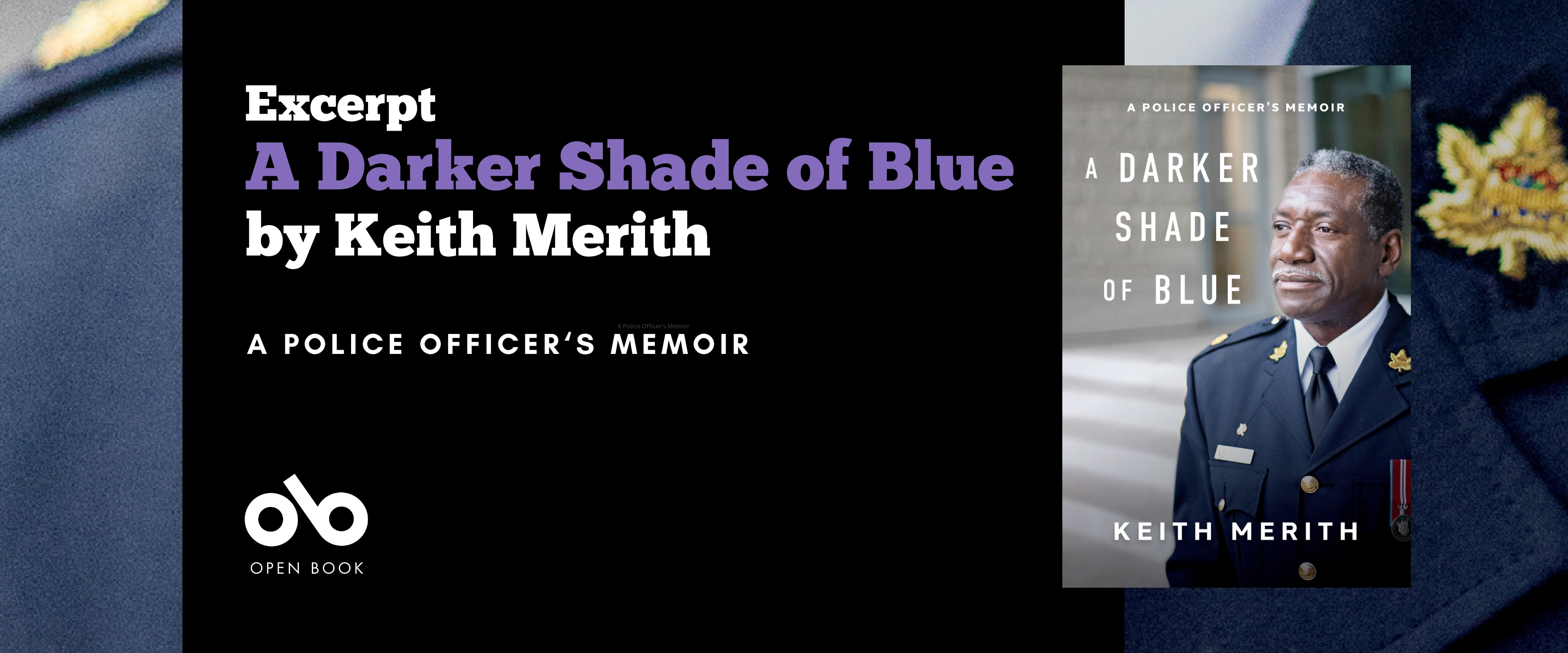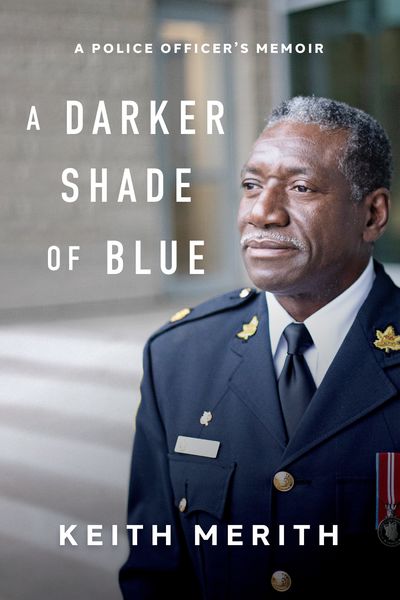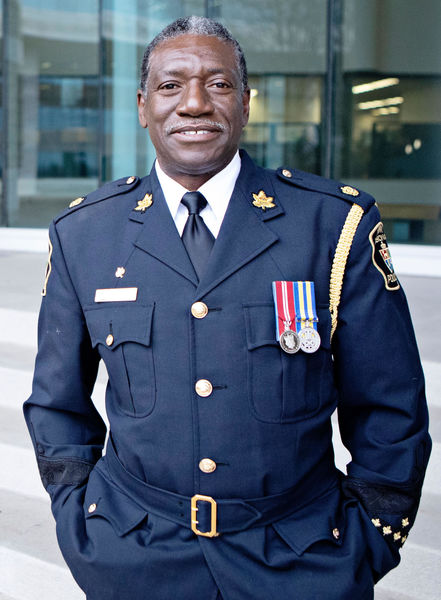Read an Excerpt from A Darker Shade of Blue: A Police Officer's Memoir by Keith Merith
At just 16 years old, Keith Merith was pulled over by a white police officer only to be berated and degraded with no cause. After being exposed to this abuse of power, Merith vowed to one day to join a police service and make positive change in a corrupted system.
When that day finally came, the starkness of Merith's challenge was meted out in daily reminders of the endemic racism and prejudice on the York Regional Police force. Despite the repeated microaggressions and slights, he kept course, fueled by the knowledge that reform was reachable and real.
In his new memoir, A Darker Shade of Blue: A Police Officer's Memoir (ECW Press), Keith Merith shares the gut-wrenching and heart-warming experiences that came with 31 years of service, all while fighting to make the police a fairer and more equitable entity in our society.
We've got a segment from the memoir to share with our readers, who can find the book in local indies and other fine sellers now!
Read an Excerpt from A Darker Shade of Blue: A Police Officer's Memoir (ECW Press) by Keith Merith:
Pinpricks and Microaggressions
After working undercover in the drug world for three years, it was time to move into another area of the service. I opted for the uniformed patrol role, as this was where I had originally wanted to explore and expe- rience the visual and hands-on aspects of policing. My new assignment was 4 District, located in what was then the town of Vaughan (and would later become the city of Vaughan). Finally, I had the chance to put on that
new uniform and equipment I’d received three years earlier.
My second day, while in the change room getting dressed, I received a page from the front desk that there was a phone call for me. I stepped out of the room, went down the hall, and answered the phone. A few minutes later, returning to the change room, I was unable to locate my four belt clips that secured my outer belt to an inner belt. They had been stolen. Could this be possible? Stolen! I have no idea why someone would take the clips or what message they were trying to send to me. Was I in for a rude awakening! Talk about the start of a bad day. I made my way to the parade room and sat among several other platoon members for our daily briefing — yes, just like Hill Street Blues or Brooklyn Nine-Nine — my uniform pressed, armed with my service revolver, and notebook in hand. The sergeant entered the room and began the briefing.
“Folks, we had a robbery of a convenience store overnight; four culprits described as male niggers who, when caught, need to do jail time and be shipped back to Africa.”
What?!
Your CanLit News
Subscribe to Open Book’s newsletter to get local book events, literary content, writing tips, and more in your inbox
No, once again, I ask you to imagine this scenario: Keith Merith, a proud young man who happens to be Black and fought like hell to get hired as a police officer, is finally sitting among his peers in uniform, thinking he is part of this new world that he longed for, and then . . . this. In a room of white officers, I was being sent a message loud and clear: You don’t belong. You are a nigger, and you need to go back to Africa. Another piece of me crumbled and fell to the floor that morning. I felt lost, ashamed, humiliated, and angry. My internal pain was paralyzing and debilitating.
At the conclusion of the briefing, on my way out of the room, Steven Patrick, a tall country boy who enjoys the simple hunting and fishing life, put his arm around my shoulders and said, “That guy’s an asshole; you are part of the team, and we’ll look after you.” That man resurrected my soul. I will be forever grateful for that single moment, the empathy, kindness, and strength of character demonstrated that day. We worked on the same platoon for approximately two years. To me, that one simple act set him above the rest. He did not know how much it meant to me. In fact, Steven’s inclusion of me extended outside of the service. He had me out on his boat on Lake Ontario, fishing for salmon (I do have a true story about the monster fish that got away that day, but I’ll reserve it for another time). Steven also invited my wife and me to his hunting camp deep in the bush of “who knows where.” This was in the middle of winter, and colder than the polar ice cap. We had a blast. Thank you, Steven, for everything.
∞
Close your eyes for a few seconds and imagine with me a time when you were stuck by a pin or a tack and remember the immediate shock of pain and realization, and your instant reflex: you rub the spot, quickly soothing it while making a mental note to not do that again. That pinprick hurt a bit, but it was certainly bearable. Now, can you think of a time when you pricked yourself over a dozen times in one day? Most of us can’t. But what if it were not self-inflicted? It was done to you at random, unannounced, recurring over many days, weeks, months, and years. I ask because that is how I perceive the realm of implicit and explicit biases along with microaggressions experienced by many Black people. Implicit biases are prejudices that turn into an action that is unconscious. Explicit biases are prejudices that you are aware of but act them out anyway. Both of these constructs require examples to get a better perspective on them.
A man goes into a major hardware store wanting some information on a building project and the tools to accomplish the job. There are a number of attendants, some of whom are female. The customer intentionally seeks out the male attendant. He may not even realize that he’s done this (implicit). On the other hand, he may have done so deliberately, believing that the male attendant would be more familiar with the trades (explicit). Either way, his biases manifested into action. It’s important to understand that implicit bias can turn into an explicit bias once it’s recog- nized and acted on, but an explicit bias can never be implicit. I’m going to say something that I think is quite profound that might take some time to sink in, but when it does, it will make sense and perhaps provide some insight into the essence of this chapter.
A bias is defined as a preference for or a prejudice against a person or a group. Implicit biases operate outside of our conscious awareness. We don’t know that we have them, although we now have the tools to be able to test for them. We also know that they often run contrary to our conscious beliefs. Dushaw Hockett, founder and executive director of Safe Places for the Advancement of Community and Equity (SPACEs) noted during a TED Talk on September 18, 2017, that a law enforcement officer who is deeply committed to the motto inscribed on his/her service vehicle (“To Serve and Protect”) can be the same officer who leads the organization in the rate of stops-and-frisks of young Black men or people of colour. Consciously, they are deeply committed to the principles of protecting and serving; unconsciously, their behaviour is inconsistent with that. It could also be said that they believe targeting and incarcerating young Black men is serving and protecting, that their racism leads them to equate the two, so they don’t see the contradiction.
Chester M. Pierce first coined the term “microaggression” in the 1970s as a way to describe the subtle insults and put-downs that African Americans experience regularly. Many such incidents can be classed as unintentional acts of prejudice. There is no harm meant, but harm is felt. Yet again, it goes to intent versus impact.
Now walk with me as I demonstrate some of the pinpricks and micro-aggressions that I felt during many of my shifts spent in a uniformed capacity at 4 District in Vaughan.
Regardless of shift, it’s customary for me to arrive early and be greeted by some members of my platoon: “Morning/afternoon, Keith.” But others acknowledge me with a “Yo bro!” (Pinprick.) Sitting on parade, I am the only officer of colour in the room and most often in the entire station. (Ouch.) When we are paraded by the sergeant, often there is a mention of Blacks or other racial minorities related to crime or to be on the lookout for. We are told those Black people might be planning a festival, party, or an event that could possibly require police intervention. (Pinprick.) Rest assured that there will be a racial joke to accompany that information. (Another jab.)
An officer notices the shine on my boots and asks if I could I do theirs for fifty cents. (Pinprick.) “Merith, you’re assigned the 420 car,” the shittiest vehicle in the fleet. (Jab.) Someone purposely removes my submitted report and I get called out by the staff sergeant as derelict in my duties. (Poke, jab, and punch.) I overhear officers referring to members of our visible minority communities in disparaging ways. (Pinprick.)
On patrol, I encounter the shock and sometimes indignation of a few folks who are not used to seeing an officer of colour, or feel that this is a reflection of the state of things to come and they don’t like it. (Pinprick.) Others are shocked and surprised when I speak with proper grammar and word formation, with no accent. (Jab.) In conversation at service calls, I get the “where are you from?” question. (Another jab.) Woven into several conversations is a denial of individual racism, as in, “I don’t see colour” or “I have friends that are Black.” (Poke.)
When I’m using the car radio or portable radio, other officers squawk it, meaning they depress their microphones, effectively cutting me off. Accident? It happened too many times in the earlier days for it to be such. (Pinprick.) On occasion, while dealing with a matter that was my call, an assisting officer moves from assisting to interfering, feeling that their whiteness is an asset. (Jab.) If a group of white kids is loitering around a convenience store, the call would be for a group of youths; if, on the other hand, it is a group of Black youths, the officers or dispatch would announce them as Black and the response would be different, with more responding officers than necessary and more sense of urgency. (Ouch.)
An invitation to grab lunch or dinner by some officers turns into a joke at my expense, with them telling the server I’ll take fried chicken with a side order of watermelon. (Sword thrust.) If, by chance, I encounter another Black officer in the station or on the road in the presence of white officers, those white officers inevitably make a comment about “Black brothers” banding together or forming a posse. (Pinprick.) Filling up the patrol car with gasoline elicits a comment about me seeking secondary employment. (Jab.)
I’m not being overly sensitive; I’m just merely pointing out that being outfitted with Black skin often brings out certain biases and microaggressive behaviours from peers and from the people you serve — not just once in a while, but all the time. What may be a “joke” to them is hurtful to us, piling up throughout the day until we’re covered in tiny wounds that begin to fester.
The world of policing was and still is to some degree the bastion of men who are predominantly white, so imagine the reality of women officers who enter into the service seeking equality and fair play. The women had it hard. The misogyny and workplace harassment never stopped. It was ever-present and underreported. Now add the fact that a small number of these female officers were Black. I would call that the perfect storm. Against all odds, some Black women set a tone and standard that was impeccable and unimpeachable. With their achievements, they sent a message across the country that Black women are a force to be reckoned with. Their accomplishments spoke to the fact that the seemingly impossible is indeed possible.
∞
The type of work police are involved in is not a good mix with these pinpricks and microaggressions, which have real negative consequences. If left unchecked, they can turn into real threats, causing real trauma. The adverse affects often cling to one’s chest and metastasize in the mind, causing irreparable damage. I was involved in one such incident that was directed at my partner by an unknown member, and it opened a wound that has never healed.
On December 8, 1988, seventeen-year-old Michael Wade Lawson, a grade eleven student attending Erindale Secondary School in Mississauga, was an occupant in a stolen black Nissan Maxima in a residential area of the city. At 7:45 p.m. that evening, Officers Anthony Melaragni and Darren Longpre of the Peel Regional Police fired six shots at the back of the vehicle. One of those bullets found its way through the back window and into the head of Lawson — he died fifteen hours later. The officers were subsequently charged.
Anthony Melaragni was acquitted of second-degree murder and Darren Longpre acquitted of two counts of unlawfully discharging his firearm. The killing of this young man was fraught with controversy, including the type of bullet that the officers had fired that evening. At the time, the standard-issued police rounds were.38-calibre. The bullets fired that night were hollow points, which were not issued by the force and certainly were against regulations. This breach was significant, as these types of bullets inflict a more lethal wound pattern and have what is known in the industry as more stopping power. I say all of this to introduce Ezra (Tony) Browne, a member of the Morality Bureau and a constable at the time, who from day one adopted the duty of being my guide, mentor, coach, and friend — he was also Black. It was an extremely rare event in those days to have two Black officers working in the same specialty unit. A few weeks after the killing of Lawson, Tony and I were in the office, sitting face to face at a desk, chatting. As I remember it, Tony was going through a stack of mail. He got to an internal mail envelope and dumped the contents on the table. It contained a single item: a hollow-point bullet. The same type of bullet that had killed Lawson. The envelope was addressed to Tony, so there was no mistaking what this was. It was a message in the form of a threat to his life. Tony had had absolutely nothing to do with the Lawson investigation. In fact, the homicide had happened in the jurisdiction of the Peel Regional Police. This was no outside threat; this was an internal message. The why is still undetermined. As if synchronized, we both became short of breath and tears welled up in our eyes. We felt the blunt edge of that bullet pierce our soul. A piece of ourselves was excised in that moment.
Together we discussed what we should do. We decided that due to the gravity of the incident, Tony would go in person to police headquarters and speak with the executive command. With weak knees and a broken heart, Tony left the office. On his return, Tony advised me that he had met with Deputy Chief Robert Wilson and had a conversation with him. The deputy was extremely sympathetic and advised Tony that he would do the best he could to look into the matter, and that included transfer- ring Tony out of the unit. Yes! A transfer out of the unit! A little while later, the unit commander of the Morality Bureau came into the office, quite disturbed and extremely pissed off. He turned to Tony saying, and I quote, “And you, Tony, keep your petty complaints to yourself!” Those nine words were forever seared in my mind, and haunt Tony to this day. A few days later Tony was transferred out of the unit. The matter has never seen the light of day since it happened. The department had failed us — instead of putting resources into tracking down the perpetrator, Tony was transferred away from a unit he’d grown accustomed to, as if he were the problem. Institutional ignorance of the effects of this type of conduct permeated the service. It severely limited the proper responses, at the expense of members such as Tony and myself.
Dealing with pinpricks and microaggressions is exhausting and painful. They can have dire consequences if left unchecked, often evolving into more constant, intensified, and potentially serious actions on the part of the offender. Why should anyone be subjected to this type of behaviour by virtue of being part of society? We should not have to live like this.
__________________________________________________
Retired police superintendent Keith Merith ended his 31-year tenure in 2017 after holding command positions, including Bureau Commander of Information Services and Court Services and Officer-In-Charge of Investigative Services and the Organized Crime Bureau. Keith volunteers with various organizations mandated to pursue social justice, police reform, and equality. He lives in Newmarket, Ontario.







